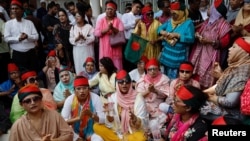Four months after a student uprising deposed Prime Minister Sheikh Hasina, most Bangladeshis want new elections within a year, despite strong support for the interim government's reform agenda, according to a new survey.
The survey, sponsored by Voice of America and conducted by a Bangladeshi research firm in late October, found that while 65.9% of respondents back ongoing government reforms, more than 61.1% want new polls held within 12 months.
The findings suggest that many Bangladeshis desire reforms and elections equally — elections to restore democracy after 15 years of Hasina's increasingly authoritarian rule and reforms to strengthen institutions weakened under her watch.
"I think that people definitely want elections, and at the same time, people definitely want reforms," said Zillur Rahman, a journalist and political commentator based in the capital, Dhaka. "This government would do well to focus only on the reforms related to elections."
The poll, based on a random sample of 1,000 respondents, is one of the largest measures of public opinion in Bangladesh since Hasina was removed from power in August. Conducted by Org-Quest Research Limited, it has a margin of error of plus or minus 3 percentage points.
The survey was conducted when the interim government began rolling out an ambitious set of reforms that officials say could take years to implement. These reforms aim to overhaul key state institutions, including the elections commission, police and judiciary, and the constitution itself, to prevent a return to what proponents call Hasina's authoritarianism.
The poll found strong support for institutional reform. An overwhelming majority of respondents (65.9%) said they wanted the government to complete "all necessary reforms" before holding elections, while 31.9% said it should focus only on election-related reforms.
Among those supporting comprehensive reforms before elections, support for reforming the election commission and several other key sectors ran upward of 90%.
But even as they supported reforms, Bangladeshis appeared increasingly impatient for new elections. Support for early elections spanned all demographics, with 60.4% of city dwellers and 61.4% of rural residents saying they wanted elections within one year.
There were 18.7% of respondents willing to wait between two and three years for new elections to allow time for reforms, while another 8.6% were open to waiting longer than a year but not more than 18 months.
In a country where results of three recent elections — in 2014, 2018 and 2024 — were questioned, the strong desire for fresh elections is not surprising, said Nusrat Chowdhury, an anthropology professor at Amherst College.
"When people think about democracy, one of the first things they think about is elections," Chowdhury, a native of Bangladesh, said in an interview with VOA. "So, I think it's kind of almost a gut response to say, 'Yes, we want elections within the next year because people want stability.'"
For the interim government, balancing calls for early elections and the need for long-term reforms is a delicate act. Since the interim government's installation in August, various political parties, including the Bangladesh Nationalist Party (BNP), the main opposition to Hasina's Awami League party, have demanded a road map for parliamentary elections within a "reasonable time."
The government, however, has not committed to a timeline. In a September interview, army chief General Waker-uz-Zaman voiced support for holding elections within 18 months. Yet, interim government officials, including leader Muhammad Yunus, have indicated elections would occur only after at least some reforms are implemented.
In a recent interview with Al Jazeera, Yunus said his government has a mandate to carry out reforms before holding elections.
"The highlight of the whole government was reform, because the whole student movement was to create a New Bangladesh," he said. "New Bangladesh is not going to come through just [by] holding a new election. Holding an election is a repetition of the old ways of doing things."
Reform advocates appear willing to give him the benefit of the doubt. Student leaders have warned that holding elections before completing the reform program will bring back "fascism," a reference to Hasina's rule.
Four months in, the interim government remains popular. Some 58.4% of respondents said it was governing Bangladesh better than Hasina's administration, while 20.4% said it was doing worse.
Some 63.2% said the government was doing a better job maintaining law and order, and 64.1% believed it was doing a better job providing security for ethnic and religious minority groups, according to the survey.
But with inflation stubbornly high, 44.7% said the government was doing a worse job reining in the cost of essential goods, with 23.8% saying it was doing a better job. And 30.8% said it was performing the same as the previous government.
As revealing as the survey might be, Chowdhury noted that Bangladesh is a deeply divided country, with most people supporting either the BNP or Hasina's Awami League.
With Awami League supporters keeping a low profile, those divisions may not be captured in public opinion surveys, she said.
"There are people who are [Awami League] loyalists. There are people who are critical of the interim government only because it came at the cost of the fall of the regime. I think when we see survey data, we also need to keep that in mind," Chowdhury said.
VOA Bangla contributed to this report.




